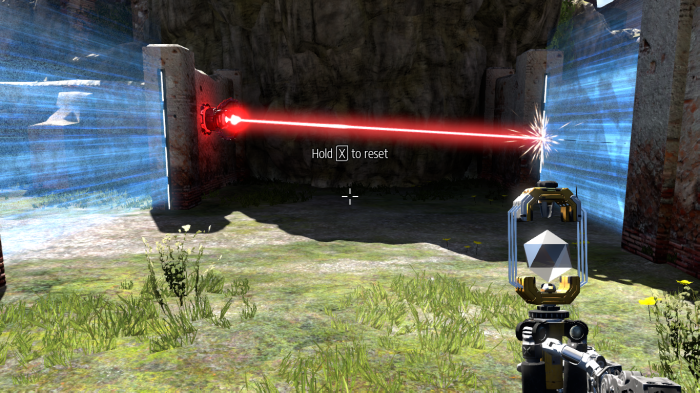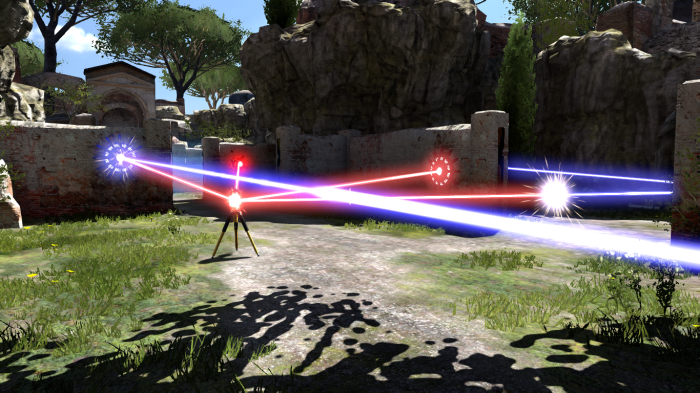I’ve been sharing The Talos Principle from a friend’s Steam library, so one thing you won’t find in this review is a complaint about the pricing of the game. I have heard that people think its base price should be cheaper, though; with this in mind, I’d like to remind you that by the time this blog post goes live, the Steam Summer sale should have started, so if you like what you see, now would be a better time to look it up than later.

I’m not that big into puzzle games. I played through the original Portal along with everyone else, but I didn’t complete Portal 2. I didn’t complete Q.U.B.E, though that’s mostly because of a time-based physics puzzle that I can’t quite be arsed to get past. And that other interesting looking puzzle platformer I mentioned a while ago, Qbeh-1? I’ve only made it to world 2. And so far I’m only halfway through The Talos Principle, but I think that I’m going to play this one to completion, maybe even to perfection. And here’s the two main reasons why:
The narrative and the atmosphere.
NOTICE: From here I discuss the narrative of the game, an experience which is, in my opinion, best experienced first-hand. I’m not giving away any blatant spoilers, but if you want to approach the game for the first time with the same sense of wonder and curiosity that I did, you’ll want to skip this next two paragraphs.
The narrative is presented to you in many forms. Firstly, you have your omniscient, godlike voice waxing biblical at you every so often. That’s Elohim. Next, you have computer terminals which offer two different sorts of insight into the narrative: the archives, and the library assistant. The archives contain texts, varying from Greek philosophy to chatroom conversations, and all of it is relevant to the game’s themes. The library assistant is… something you’ll have to discover for yourself. It nearly gave me a damn existential crisis, and that’s all I’ll say. To coincide with the text files you find on the computers, you can also find audio logs from one of the characters mentioned in emails, chatrooms, journalistic articles, what have you. She keeps a sort of diary. And finally, you have messages from other robots like you, painted on the walls in QR codes. They all have varying personality traits and offer different insights into the world around you.
All of these combine to form a puzzling narrative which you, as the player, piece together, bit by bit, to try and figure out who, what, when, where and why you are. You’ll form an opinion on Elohim, and devise theories on what you are based on the other fragments of information in the world around you. But what this game does so cleverly, in my opinion, is link the seeking of purpose that you as a protagonist strive for, to the seeking of purpose that you as a human being might too endure. (See what I mean about the existential crisis thing? You need to be mentally prepared for this game. It’s philosophical.)
The atmosphere of the game itself is something that keeps bringing me back. I’ll only talk about the first zone here, so as not to spoil what comes later. The somewhat somber soundtrack really lends itself to the lifeless setting of the ruins around you, but not in a depressing manner – in an enchanting one. The sense of wonder and discovery I feel when I solve something and progress through the narrative is brilliantly rewarding, and the juxtaposition of the natural setting and the fact that you’re a damn robot solving puzzles (not a spoiler, you can see a third person perspective the moment you enter the game) of technologically advanced equipment in some old Greek or Roman ruins only adds to the many questions that might be going through your mind.

But I think it’s time to talk about the gameplay itself. I had no idea what to expect when I booted up this game for the first time. I mean, with Portal, it’s fairly obvious that you’re going to be thinking with portals, but The Talos Principle doesn’t support any such focus on a particular gimmick. Instead, it presents you with gate-opening logic puzzles, later combined with lazer-directing puzzles, switch-pressing puzzles and a whole myriad of further gadgetry to discombobulate and bamboozle you out of the swift victory that the deceptively easy-looking puzzle promised you. But here’s the thing – in the 50 or more puzzles I’ve completed, I’ve only come across one that’s completely stumped me. Sure, some of the harder ones have caused me to stomp off from the game for a while, but I always come back the next day and take the time to figure it out. And the sense of accomplishment when you do is exactly what most puzzle games seek to emulate in their iterations of the genre. The Talos Principle isn’t too easy and it isn’t too hard, and that’s more important for a puzzle game to get right than for most others.
Now if you’ll excuse me, it’s about time for my daily Elohim worship, for he is the Lord, and the Saviour, and the Light. (Just kidding, I’m probably rabidly flicking through the pages of the Steam sale as you read this.)